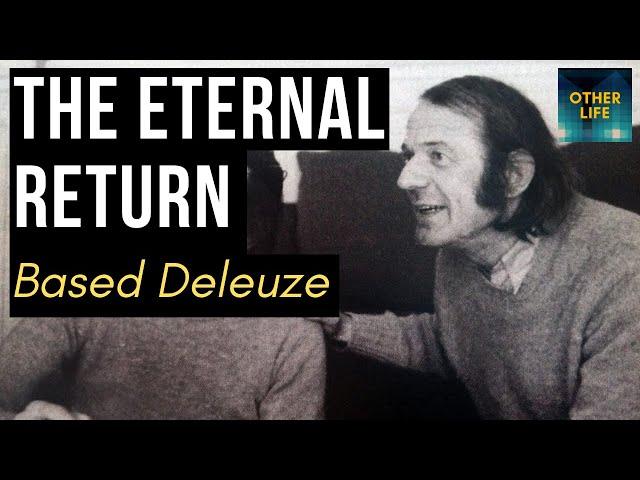
The Eternal Return (Based Deleuze on Nietzsche)
Комментарии:

Exegesis interpretation
Ответить
How do you gauge what counts as a dice throw? You give the high-school sweetheart example and okay I get that. But what if I develop a hobby ... does this imply I should pursue it more seriously? Sounds somewhat arbitrary when to this line of thought and consider it a commitment.
Ответить
No disrespect to Todd May but you explained deleuze’s ER way more clearly and succinctly than he did in the lecture series he gave in difference and repetition
Ответить
wow very interesting thank you
Ответить
these kinds of videos are way better than the live-streams imo
Ответить
do you ever think that you might be over analyzing this?
Ответить
this is all fascinating ! seriously one of your best videos ever/ that said,, i'm also curious about Watcher's question. how do you fit, say, turning away from academia after so many years with this idea of affirming the past? is that simply reinterpreting what the old dice throws truly meant? or maybe a more charitable way of saying that would be that it is affirming what the previous dice rolls have come to mean after all this time (& many more dice rolls)
Ответить
Really enjoy these short and concise videos. Maybe you could have someone time stamp the parts of your live steams when you talk about something specific
Ответить
Any dead thing can go with the flow of a river, it takes a living thing to swim against it
Ответить
You'r egoing places lad!
Ответить
Based
Ответить
S Gauguin should have stayed in Paris?
Ответить
You have described levels 1 and 2 but not level 3! Level 1: Shit: You're just being led around by your ever-changing desires and you hurt other people. Level 2: It's noble but you're just giving in to the world you've been given, you're just giving up and being a slave. Level 3: You can apply laser-sharp reasoning to evaluate the results of the dice throw and change them. Rather than giving up and living a life of unhappiness, you evaluate the situation as rationally as possible, taking your higher values as axioms (the golden rule should be a given) and create the bridge to get to the worldview/circumstances that you want. You decide which circumstances you like and don't like based on the higher values that you have created. For example, you marry your high-school sweetheart but discover that you're not compatible and you're both unhappy. Why not choose to break up the marriage in the best way possible (making sure everyone's suffering is minimised as best as you can). Level 4 is currently in development...
Ответить
I highly recommend Pierre Klossowski's book on Nietzsche, Nietzsche and the Vicious Cycle. He grounds his analysis almost entirely on Nietzsche's journals and letters, focusing on the eternal return as a real experience that Nietzsche had, and how it drove him insane. Also, he dedicated that book to Deleuze and Deleuze (I think?) dedicated his book on Nietzsche to Klossowski. That's mainly how I think about the eternal return, a real experience of true immanence, not just a thought experiment. Rather than the eastern idea of reincarnation I think it's actually closer to enlightenment, though in Nietzsche's case it made him lose his mind, which is understandable because he had his experience in a state of delirium brought on by severe illness. It's kind of like the experience people often have with psychedelics of "oneness with the universe" or whatever, but like Nietzsche's eternal return that experience doesn't last, though I guess it's up for debate whether or not any Buddhists who attained enlightenment actually ever managed to stay in that state all the time. Anyway, I don't really disagree with anything you said, I just think of the eternal return as a "heavier" concept than they way you're talking about it.
Ответить
the sailors' perspectives on Jonah, pre and post dice throw.
Ответить
lmao get a job
Ответить
Deleuze the schizoanalist? Deleuze, the guy who used sado-masochistic, libertine sexual relationships and heroin addiction as examples of branching out into "what a body can do"?
Deleuze the guy who wanted to destroy the superego and individual completely?
Your interpretation doesn't even make sense - should crack babies stick to being crack babies then? Should cancer be affirmed in such a "committal" way? Fuck no. How do you miss this?
"This is why self-destruction is said to be an active operation an 'active destruction'. It and it alone expresses the becoming-active of forces: forces become active insofar as reactive forces deny and suppress themselves".
In other words, it's up to you to get a divorce if your wife is getting you down all the time. You're what he calls a fatalist, positively affirming without understanding.

These "obligations" may stem from previous decisions, commitments, and dice throws, but isn't the continued commitment to that obligation itself a recurring decision to be made? Why is a future dice throw that counter-acts a previous one inherently problematic? If we decide to cheat or stay loyal to our partner, is that not on both sides still yet another dice throw in addition to any previous one. The decision to remain loyal to a previous decision is itself a renewed and unique decision to be made over and over when any legitimate temptation to change paths arises. I fear that you are presupposing a past-oriented obligation akin to the fallacy of appealing to tradition. In and of itself, a past obligation should hold no inherent legitimacy solely on behalf of it having already been made. The reasons for committing to the original obligation, if they are not sufficient to extend the obligation into the present and future, give way to a genuinely new decision to be made.
Ответить
Deleuze's "difference" and Bataille's General Economy/Accursed Share, and Land's Positive Feedback are the best encapsulations of Nietzsche, especially to do with the Eternal Recurrence.
Ответить
Deliooze
Ответить
Latent traditionalist
Ответить
"Sounds spooky to me!" - Max Stirner
Ответить
Coded conservative ideas??? You are an idiot dude hahahah :)
Ответить
I think that the "roll of a dice" is not a good metaphor for the idea of the Eternal Return - especially not in the way you've presented it. The Eternal Return, as you yourself said in the beginning, is the idea that everything that one has experienced in one's lifetime will be happening over and over again for eternity. In your interpretation of this, any dice that has already been rolled in one's lifetime not only cannot be unrolled (which is of course natural, given the linear nature of time), but must also crucially be adhered to and affirmed, even when some future event has proven it miscalculated. In the notion of the Eternal Return this mistake will indeed be eternally repeating itself, but the possibility of the realisation of the mistake will also be repeating itself. So, one is faced with two possibilities: one will either a) choose to correct their mistake, lead their life based on their renewed understanding of their actions, and consequently see this "renewed" life eternally repeating itself; or b) one will turn a blind eye on their mistake and not recognise it, and go on to continue living supressing the notion of this crucial diceroll being a wrong decision which can be corrected, just for the sake of it having already been made, and consequently see this fatalistic life of their's eternally repeating itself.
Ideally one must be able to be cool with the idea of their actions infinitely repeating themselves, as you pointed out. I believe that Nietsche himself would accuse anyone choosing option (b) and being cool with it as someone having a Sklavenmoral, exactly the one thing he himself hated in Christianity. Instead, one should have the courage to change one's life: when faced with Fate, they prefer to accept it, rather than try and change it. Option (a) would then be the only possible choice for anyone wanting to not be crashed under the weight of deliberately allowing a mistake to mark not only one part of their life, but the whole of it, and then be eternally repeated over and over again.

No, it seems that this would fail. Nietzsche's main influence one of the biggest ones was Shappenhauer, so it probably is inspired by Hinduism. It is way too tilted to Hinduism given Shouppenhauer´s influence. But what he offers here, this interpretation is highly problematic. He finds it liberating to not grow epistemologically. Once you are presented with the truth, when chance ends, and finality or mortality appears (certainty), you are to deny this degree of registering the truth, this woman was not committed in any way, and will not be, and assert the lie. Having that as a foundation can only lead to more disastrous outcomes. If you do not he sides with the notion that the next psychological state that you will fall under will be "resentment". The latter undefined, but in watching introductions to Nietzsche you noticed that he uses this concept to insist that the victims of slave societies, or, feudal lords were simply people that disliked them not because they were able to register the limits of the types of incestual exploitative relations, but rather because they would have done the same. The slave is simply someone that even if they register how bad the exploiter is the exploiter outlines the limits of what is possible so he cannot outdo him in social relations he can only fall in love with him. No productive intellectual labor may arise that is culturally valuable: only resentment for not being as great as the exploiter or the more pc word "slave master". Yes, his concrete example leads directly to reactionary practices: enslave yourself to falsehood, and those that exploited your moral faculties, otherwise, if you do not then all chaos will ensue: either resentment or, nihilism. You are not to attribute to your life the worth the moment of truth afforded you,. but rather obey them given there is no reason. This degree of obeying those that hold no commitments to not treating others as objects of exploitation is simply a fascist recipe. Very necessary during the return of fascism in all contemporary societies.
Ответить
For added context: This man was left by his high school sweetheart
Ответить
You have the feeling of Free Will, in actually is worthless. Man can indeed do what he wants, but he cannot will what he wants." Therefore there's no you as a separate individual, but there's freedom in knowing this. The resistance is your ego saying no I won't accept that I'm a fiction.
Ответить
Justin, you keep saying ‘socially liberal, dissolute..’. Are you equating them, or just addressing a particular breed of nihilist? And are you saying marrying and staying with a first love is one reading of Deleuze’s dice that is useful in undermining that nihilist interpretation, or that it is the correct one? (Just trying to understand the vid)
Ответить
This is a poor representation of Nietzsche's eternal recurrence, and probably a poor representation of Deleuze's Nietzsche. The whole bit on relationship commitments is where Justin went terribly wrong (the "high school sweetheart"). Nietzsche spilled so much ink for his disgust for Socrates. One line in his list of reasons is because Socrates chose to take the hemlock rather than to live. This was an example of Socrates believing in his commitment to truth against the will for life. Nietzsche famously asked "What in us wants truth?" (Aphorism 1 in Beyond Good and Evil). He also showed that the will-to-truth and to-knowledge were fictions. Deleuze's reading confirms this: "It is understood that 'life aims to mislead, to dupe, to dissimilate, dazzle, to blind'" (Nietzsche and Philosophy, 96). Lying is an important, and natural, technique found in nature and in humans.
There is no obligation, like a commitment to a lover, in Nietzsche. Rather, what we find is that a virtuous human creates their own values: they set their own goals to achieve and then work to achieve them. Not changing ones mind over a relationship commitment is a rather poor and irrelevant example. It's like that art piece with two lovers who forced themselves to live together, tied together by rope for one year, and broke up after that year. To liken a romantic commitment to an endurance test is extremely stupid: that's why it only works as a canonic art piece. Nietzsche despised in Socrates a mindless commitment to truth, and you want to tell us that he meant a relationship. Nietzsche longed for the barbaric spirit: where's the barbarism in that? Also, Nietzsche famously had a troubled relationship with women (and this is not virtue signal).
A relationship: bad example or worst example?

Just want to mention for anyone who may be interested that I think Deleuze and others (Badiou and Meillassoux immediately come to mind) get the concept of the dice throw from Stéphane Mallarmé—specifically his poem “Un coup de dés jamais n'abolira le hasard” (“A Throw of the Dice will Never Abolish Chance”).
Ответить
Wtf? Haha. One can leave relationships and change commitments while still affirming one’s past. A change of commitment is not necessarily necessitated by resentment. Also, I think when we dig into these ideas they become far less clear than they originally appear. Let’s say you do marry your high school sweetheart and they’re not what you think they were. Justin says that we shouldn’t leave the relationship but should instead invoke creativity to beat the challenge. What happens when we explore this idea? It becomes the same basic idea as leaving the relationship; change. If one is to get creative in a relationship when this problem is presented then this implies change. Someone needs to change. If my partner is not who I thought they’d be then I either have to change them or how I view them. So one has to try and leave the past where it is, instead of leaving the person, by changing the person or self. There’s always a certain commitment that needs to be left behind. I’m not sure why Justin places more emphasis on one type of leaving commitments than another....
Ответить
If you move into an apartment you must stay there for the rest of your life or you do not affirm the dice throw and you resent the past.
Ответить
The dice throw doesn’t give you a licence to be a douchebag.
Ответить
No offense of course we all have our intellectual flaws and biases but from what I've observed on almost every topic you've covered in video from my perspective it seems like you interpret what is read inaccurately at a bizarre scale just so you can justify and reedify your preestablished sense of morality and values like when Adolf Hitler used the ideal of an Ubermench from Nietzsche to support his completely irrelevant ideological perspective and as a side note I really wouldn't consider it fair to call someone who doesn't hold themselves to fixed commitments socially liberal, pragmatically liberal **maybe** but keep in mind it is not completely necessary to hold yourself to political or moral commitment to make political change, try insurrection !!
Ответить
I don't know what more naive, Justin's imagination of what a liberal's interpretation of Eternal Recurrence ("Fuck it; it's all futile) or Justin's insistence that Eternal Recurrence is tied to loyalty and faith. Where is Nietzsche's treatise on Loyalty and Faith? It's nowhere. In fact, Nietzsche and Deleuze discuss the importance of semblance, disguise, and lying. Repetition is a mask, for Deleuze, and Nietzsche says that all that is profound wears a mask (and so does Oscar Wilde). Justin has this all wrong. Nietzsche makes it clear that if there is an imperative, that imperative is
"'You shall obey -- someone and for a long time: else you will perish and lose the last respect for yourself"' -- This appears to me to be moral imperative of nature which, to be sure, is neither 'categorical' as the old Kant would have it, nor addressed to the individual... but to peoples, races, ages, classes -- but above all to the whole human animal...."
Beyond Good and Evil, aphorism 188
Justin, please learn to read Nietzsche before you start with Deleuze.

This was very interesting, thanks
Ответить
damn g, tryna use postmodern philosophy to justify why the girl who left u in highschool is a bish
Ответить
na but fr, what is this idea of commitment in these "Dice rolls"? From what i've gathered on del he believed the eternal return might be rather a processes of ridding deniability to one's true desires or a bodies full motion toward action. When the dice roll is made we see all other commitments suspended in both being denied and affirmed waiting on the result of the roll. Based on the dice's result we can see many other rolls be vanished in the process because they fundamentally deny the result of the new dice roll. It's not staying committed to one's decisions but rather building upon them through a constant stream of connections and choices one can make, this is fundamentally how we grow, we shouldn't stay in a relationship because the idea of it is a challenge, you should stay in a relationship only if it reflects in the true desires of your end. Another example to build upon the metaphor of a dice roll is that if you were to play again, lets say the first game was for 500 dollars, and you call another 1000 dollar game, the commitment immediately dissolves into two other's, either you owe $1500 or u get 500. The body will move constantly denying things previously seen as affirmations in sake for its own acceleration in it's processes, ridding deniabilities. lets say your high-school sweetheart ends up being not just not the person you thought they were, but they feel the same towards you, of course trying to find affirmations is not futile, but it can see it's bitter end of turning into a deniability, to stay in a relationship at that point would lead to a state of total paralysis. j my interpretation thooooo
Ответить
Hey man, good thoughts, but try to smile sometimes..
Ответить
conservative tries to read deleuze
Ответить
This is the blind asking, where is the light switch?
Ответить
This is not Deleuzes Nietzsche, totally ignores the theory of forces which kinda goes hand in hand with er
Ответить
My degree drove them away and they just wanted to be dionysus
Ответить
Es muss sein
Ответить
Regurgitating "The Dice Man" but unaware of it. It wasn't clever in the 70s and it isn't clever now.
Ответить
>writes a book on Deleuze
>can't pronounce his name

If anyone would like to know what Deleuze himself wrote about these topics, and to see for themselves how horribly they are being distorted here, then I would recommend getting a copy of, or looking up online, Deleuze's book Nietzsche and Philosophy. If you read sections 11 & 12 of chapter 1 on "The Dicethrow" and "The Consequences of the Eternal Return," you'll find that the affirmation and necessity discussed within has nothing to do with obligation, obedience, commitment, loyalty, duty, etc. to remain "locked in to one's commitments". Affirmation is of chance itself and the affirmation of necessity is the necessity of chance itself, not any particular determinate state of affairs or an arbitrary subjective state of choosing commitment to some determinate identity preserved through time. Something that would be completely absurd without Justin Murphy's implicit selection of what dicethrows one forces oneself to be obligated to (i.e. the one's supporting a "radically grounded cultural conservatism"). For example, following his logic, am I obligated to like a band forever because I declared myself a fan of them when I was 14? Won't all these absolute commitments from the past just pile up to the point where they begin to mutually exclude each other? The 'mode of life' implied by such a based Kantian morality of arbitrary and contradictory duties has more to do with the internalized guilt of bad conscience rendered infinite that Nietzsche said was the result of Christianity.
Also if you read section 11 of ch. 5 on "The Sense of Affirmation," you'll find a discussion of Nietzsche's use of the symbols of the donkey/ass and the camel, and how they are related to each other. The ass is the animal that affirms falsely because it says "yee-aww" to everything, and this is also like the state of the camel who thinks that affirmation is to bear the weight of every burden, every obligation, every commitment and every value of the past. Affirmation for both Deleuze and Nietzsche is never a simple obedience to a past or present actuality. For Deleuze, in Difference and Repetition and The Logic of Sense, it has to do with an ethics of "willing the event" which is distinguished from any particular state of affairs or occurrence, and this corresponds to a practice of "counter-actualization" in which one extracts the virtual potencies or the differentials of real potentiality, that are inseparable from a process of actualization but different in nature from any of those actualities. Also, regarding the eternal return being time itself, in Difference and Repetition, the eternal return is the 3rd synthesis of time which breaks the circle of the past/memory and the present/habit, so that it becomes an eternally decentered and eccentric circle that is radically *un*grounded from any fixed hinges or cardinal points, not time as simple succession and accumulation from the past.

It seems likely to me that N. intended the eternal recurrence to connect directly with his concept of amor fati. One should never wish things to be any different in one's life. One should love his fate and desire to live that fate over and over again down to the smallest detail, every positive and every negative, every love and every loss, because -- and I think this is N. coming to terms directly with Schopenhauer -- the only alternative is the pessimism of frustrated Will. Amor fati and the eternal recurrence is the most life-affirming, Dionysian thing ever.
Ответить
I'll keep this in mind next time I step in a bear trap
Ответить


![[Former WR] Slackers Carts of Glory - Coasting in 29.468 [Former WR] Slackers Carts of Glory - Coasting in 29.468](https://ruvideo.cc/img/upload/ODRMR2Z6NDFRcEw.jpg)


![[SOLD] Sett Type Beat 2023 - "Club" [SOLD] Sett Type Beat 2023 - "Club"](https://ruvideo.cc/img/upload/a0xtSjk5dkFWdjA.jpg)














